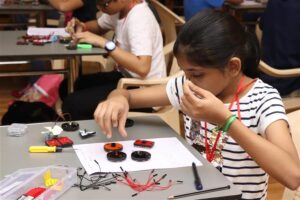In today’s modern era, digital education has become just as important as science and maths skills. Yet introducing young kids to the digital world is much more than just allowing them to sit in front of a phone, but helping them understand how technology works. Many people say coding is not necessary until high school, but the fact is earlier you start learning something, the easier it becomes to master.
This early stage is very crucial for learning skills to get lifelong lessons. Schools focus on cramming and memorizing facts and figures and don’t encourage a child to understand deeply, grab concepts, and learn problem-solving skills or lateral thinking. A new education system is on the rise called STEM Education which focuses more on concept-based and hands-on experience than just rotting. STEM stands for Science, Technology, Engineering, and Maths.
STEM education is the future of education. There is a projection that there will be a rapid increase in jobs within ten years. Thus the modern education system needs to change into a more skill, practicals, concept, and real-life-based education system. It will help our kids develop essential skills which will help them to secure a better job and improve our society. So creating interests in their minds is very important.

Other co-relating courses like Robotics can also help a child to develop an interest in STEM Fields. Robotics education for kids combined with coding can help them to develop problem-solving skills and will allow them to connect concepts. It involves learning about circuits, boards, sensors, motors, and other electricals, that we use in our daily lives. Robotics learning for kids is also a promising and beneficial option for kids who want to get into the Robotics industry.
Hundreds of kid’s coding classes are available, and therefore parents need to choose the right one for their kids. Parents to check for classes that provide a dynamic learning environment, well-prepared course structure, and overall skill development. Coding and Robotics are concept-based disciplines which means that they need to be performed and evaluated.

